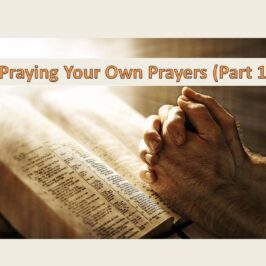TEXT: ‘There once was a man named Job who lived in the land of Uz. He was blameless—a man of complete integrity. He feared God and stayed away from evil’ (Job 1:1 NLT) THOUGHT: When evangelising I have been asked many times, “Why does bad things happen to good people?” or “If God is a God of love why does He allow so much suffering?” Sometimes we do not have easy answers to difficult questions. When Abraham was interceding with the knowledge of God’s impending judgment on Sodom and Gomorrah, he said, ‘Shall not the Judge of all the earth do right?’ (Genesis 18:25). The answer is always a resounding, “Yes!” The Book of James makes this very clear, ‘Remember, when someone wants to do wrong it is never God who is tempting him, for God never wants to do wrong and never tempts anyone else to do it’ (James 1:13 TLB). God is good, all the time! In Part 1 of this study we considered Job’s family, finances and fear. Part 2 highlights two more aspects of Job and the ordeal he went through. Job’s Frustration A. With his friends – ‘Miserable comforters are you all’(Job 16:2) Sometimes we have to be willing to let people pour out...
Learn MoreTEXT: ‘There once was a man named Job who lived in the land of Uz. He was blameless—a man of complete integrity. He feared God and stayed away from evil’ (Job 1:1 NLT) THOUGHT: Job is one of the most remarkable books in the Bible. There is so much to discover when someone is willing to wade through the dialogue. Try it and see for yourself! Reading it out loud to myself certainly helped me to understand more the depths of despair Job had sunk to, yet he maintained his faith. He certainly is a shining example to the many who let the least thing hinder their relationship with God and attendance at their local church. The book opens with tragedy hitting this godly man. Bad things happen to good people! God is a good God but Satan is a mean devil. Never confuse the two. Unknown to Job, conversations between God and Satan resulted in him suffering in a way perhaps no other person has. Today’s Teaching concentrates on the reasons for this unimaginable trial, his reactions to it and its final outcome. Job’s Family Job had a wife, seven sons and three daughters. There was a strong bond of love between all of them. Whenever the sons...
Learn MoreTEXT: ‘Therefore I will look to the Lord; I will wait for the God of my salvation; My God will hear me’ (Micah 7:7) THOUGHT: Waiting for God to answer and bring about a change to a situation can be one of the hardest things to do. Delay can seem like denial but often it is not the case. In the Bible there are a number of scriptures that refer to ‘waiting’ and Today’s Teaching highlights five areas we need to be aware of and focus on. Wait Politely – ‘Let every man be swift to hear, slow to speak, slow to wrath’ (James 1:19) Waiting can bring out the worst in us. Think about reactions, ours included, of people waiting in a queue, whether at the supermarket, traffic lights or the entrance to a big event. How impatient we can get even over the slightest hesitation by the person ahead of us. Many an obscenity has been shouted at the car in front for taking off slowly after the light has turned green. Having driven in Africa and Italy, the use of horns there to express frustration and anger is widespread! The epistle of James exhorts us to be slow to respond and get angry because, ‘Anger will...
Learn MoreTEXT: ‘Love suffers long and is kind’ (1 Corinthians 13:4) THOUGHT: Another word for humanity is mankind. If the syllables were reversed how much better it would read – Kindman! How this world needs a good dose of kindness. The Bible also uses the word ‘lovingkindness’, and this is what God displays towards us that helps draw us to Him in the first place. ‘How precious is Your lovingkindness, O God! Therefore the children of men put their trust under the shadow of Your wings’ (Psalm 36:7). ‘Who redeems your life from destruction, who crowns you with lovingkindness and tender mercies’ (Psalm 103:4). ‘I know that You are a gracious and merciful God, slow to anger and abundant in lovingkindness, One who relents from doing harm’ (Jonah 4:2). Today’s Teaching focusses on five aspects about kindness that we need to be aware of. It’s an add-on to our faith – ‘But also for this very reason, giving all diligence, add to your faith virtue, to virtue knowledge, to knowledge self-control, to self-control perseverance, to perseverance godliness, to godliness brotherly kindness, and to brotherly kindness love’ (2 Peter 1:5-7) We may be better at some of these add-ons than others, but kindness is one area we must keep working on. It’s all too easy to fall back into selfishness and become inconsiderate about...
Learn MoreTEXT: ‘Hezekiah took the letter from the envoy and read it. He went to The Temple of God and spread it out before God. And Hezekiah prayed—oh, how he prayed! God, God of Israel, seated in majesty on the cherubim-throne. You are the one and only God, sovereign over all kingdoms on earth, Maker of heaven, maker of earth’ (2 Kings 19:14-15 MSG) THOUGHT: The biblical account about King Hezekiah gives an interesting perspective on how his prayer life developed. It’s easy to neglect prayer when the going is easy, but when trouble comes we can be left wondering what to do. The Assyrian army, which had overrun Israel, was looking to add Jerusalem to their list of conquests. There are four things I want to highlight about Hezekiah’s reactions and prayer life. In Part 1, we studied how Hezekiah tried to deal with the problem through his own efforts, but the enemy kept coming back for more. Unable to find a solution he turned to someone he believed was in touch with God, Isaiah, who after praying received an answer of deliverance. This gave Hezekiah confidence that God was with him and Part 2 shows how that confidence enabled him to start praying his own prayers. Let God’s...
Learn More





Recent Comments